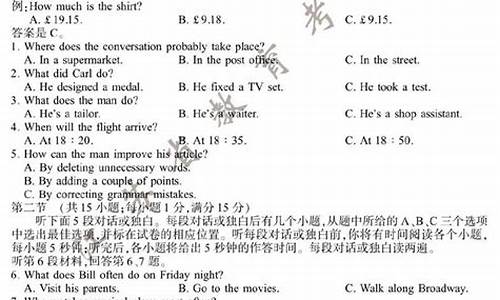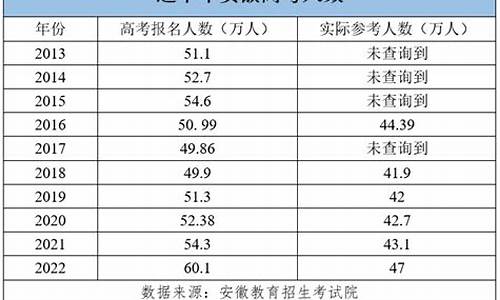您现在的位置是: 首页 > 教育研究 教育研究
江苏英语高考2017试卷答案,江苏英语高考2017试卷
tamoadmin 2024-06-19 人已围观
简介1.2017年江苏高考总分及各科分数 分值是多少2.2017年成人高考《英语》语法误用:虚拟语气3.2017年高考试题全国各个省试题都一样吗和2016年相当。分数线估计也会和去年持平。2017年的江苏高考语文试卷揭晓之后,学生们虽然普遍反映试卷较为平稳,但感觉还是有难度,下手做起来不很顺畅,特别是作文不好把握。笔者对试卷内容进行粗略分析之后,总体感觉试卷整体上平稳,保持了高考试卷结构上的延续性;但
1.2017年江苏高考总分及各科分数 分值是多少
2.2017年成人高考《英语》语法误用:虚拟语气
3.2017年高考试题全国各个省试题都一样吗

和2016年相当。分数线估计也会和去年持平。
2017年的江苏高考语文试卷揭晓之后,学生们虽然普遍反映试卷较为平稳,但感觉还是有难度,下手做起来不很顺畅,特别是作文不好把握。笔者对试卷内容进行粗略分析之后,总体感觉试卷整体上平稳,保持了高考试卷结构上的延续性;但仔细体会之下,觉得试卷还是有细微的变化。
22017江苏高考数学试卷难不难
2017年江苏高考数学试卷,在保持稳定的基础上,进行适度的改革和创新,对数据处理能力、应用意识的要求比以往有所提高。2017年江苏数学试卷在“稳中求进”中具体知识点有变化。
1.体现新课标理念,实现平稳过渡。试卷紧扣江苏考试大纲,新增内容的考查主要是对基本概念、基本公式、基本运算的考查,难度不大。对传统内容的考查在保持平稳的基础上进行了适度创新。如第7题首次考查几何概型概率问题。
2.关注通性通法。试卷淡化了特殊的技巧,全面考查通性通法,体现了以知识为载体,以方法为依托,以能力考查为目的的命题要求。 如第17题解析几何考查两直线交点以及点在曲线上。第20题以极值为载体考查根与系数关系、三次方程因式分解。第19题以新定义形式多层次考查等差数列定义。
3.体现数学应用,关注社会生活。第10题以实际生活中运费、存储费用为背景的基本不等式求最值问题,第18题以常见的正四棱柱和正四棱台为背景的解三角形问题,体现试卷设计问题背景的公平性,对推动数学教学中关注身边的数学起到良好的导向。
4.附加题部分,前四道选做题对知识点的考查单一,方法清晰,学生入手较易。两道必做题一改常规,既考查空间向量在立体几何中应用,又考查概率分布与期望值,既考查运算能力,又考查思维能力。
2017江苏高考理综试卷难不难
试题难度与去年相比有所降低,难度适中。选择题着重考虑3-3,4,5三本选修内容和部分电磁学内容。实验是力学内容。计算题突出考虑力学与电磁学的主干知识,考查学生应用物理规律解决问题的能力,重视对简单物理知识的本质的理解,计算量不大。2017年的计算题的难度相对于2016年有小幅下降。
2017江苏高考文综试卷难不难
总体而言,2017年高考政治试题与2016年相比难度相当。试题不偏、不怪,背景材料更加关注社会热点,大量运用了学生在生活中的实例,贴近学生,灵活地考查了课本知识,试题设问方式直接,试题稳中求新,达到了考基础、考能力、考综合素质的目的。
2017年江苏高考总分及各科分数 分值是多少
1 不定式作宾语
1) 动词+ 不定式
afford, aim, appear, agree, arrange, ask, be, decide, bother, care, choose, come, dare, demand, desire, determine, expect, elect, endeavor, hope, fail, happen, help, hesitate, learn, long, mean, manage, offer, ought, plan, prepare, pretend, promise, refuse, seem, tend, wait, wish, undertake
The driver failed to see the other car in time. 司机没能及时看见另一辆车。
I happen to know the answer to your question. 我碰巧知道你那道问题的答案。
2) 动词+不定式;动词+宾语+不定式
ask, beg, choose, expect, hate, help intend like, love, need prefer, prepare, promise, want, wish
I like to keep everything tidy. 我喜欢每件东西都保持整洁。
I like you to keep everything tidy. 我喜欢你使每件东西都保持整洁。
I want to speak to Tom. 我想和汤姆谈话。
I want you to speak to Tom. 我想让你和汤姆谈话。
3) 动词+疑问词+ to
decide, know, consider forget, learn, remember, show, understand, see, wonder, hear, find out, explain, tell
Please show us how to do that. 请演示给我们如何去做。
There are so many kinds of tape-recorders on sale that I can't make up my mind which to buy.有这么多的录音机,我都拿不定主意买哪一种。
注意
疑问词带不定式在句中作成分时,谓语动词用单数。如:The question is how to put it into practice. 问题是怎样把它付诸实施。
2. 不定式作补语
1) 动词+宾语+不定式(to do)
advise, allow, appoint, believe, cause, challenge, command, compel, consider, declare, drive, enable, encourage, find, forbid, force, guess, hire, imagine, impel, induce, inform, instruct, invite, judge, know, like, order, permit, persuade, remind, report, request, require, select, send, state, suppose, tell, think, train, trust, understand, urge, warn
a.Father will not allow us to play on the street. 父亲不让我们在街上玩耍。
b.We believe him to be guilty. 我们相信他是有罪的。
Find 的特殊用法
Find 后可用分词做宾补,或先加形式宾语,再加形容词,最后加带to 的动词不定式。find后也可带一个从句。此类动词还有get,have。
I found him lying on the ground.
I found it important to learn.
I found that to learn English is important.
典型例题
The next morning she found the man ___ in bed,dead.
A. lying B. lie C. lay D. laying
答案:A.find的宾语后面,用分词或分词短语,起宾语补足语作用。现在分词表达主动,也表达正在进行,过去分词表达被动。
2) to + be 的不定式结构,作补语的动词。
acknowledge, believe, consider, think, declare(声称), discover, fancy(设想), feel, find, guess, judge, imagine, know, prove, see(理解), show, suppose, take(以为), understand
We consider Tom to be one of the best students in our class. 我们认为汤姆是班上的学生之一。
典型例题
Charles Babbage is generally considered ___ the first computer.
A. to invent B. inventing C. to have invented D. having invented
答案:A. 由consider to do sth. 排除B、D。. 此句只说明发明这一个事实,不定式后用原形即可。而C为现在完成时,发明为点动词一般不用完成时,且此处也不强调对现在的影响,因此不选C。
3) to be +形容词
seem, appear, be said, be supposed, be believed, be thought, be known, be reported, hope, wish, desire, want, plan, expect, mean
The book is believed to be uninteresting. 人们认为这本书没什么意思。
4) there be+不定式
believe, expect, intend, like, love, mean, prefer, want, wish, undrstand
We didn't expect there to be so many people there. 我们没料到会有那么多人在哪里。 注意
有些动词需用as 短语做补语,如regard, think believe, take, consider.
We regard Tom as our best teacher. 我们认为汤姆是我们的老师。
Mary took him as her father . 玛丽把他当作自己的父亲。
3. 不定式作主语
1) It's easy (for me) to do that. 我做这事太容易了。
easy, difficult, hard, important, possible, impossible, comfortable, necessary, better; the first, the next, the last, the best, too much, too little, not enough
It's so nice to hear your voice. 听到你的声音真高兴。
It's necessary for you to lock the car when you do not use it. 当你不用车的时候,锁车是有必要的。
2) It's very kind of you to help us. 他帮助我们,他真好。
kind, nice, stupid, rude, clever, foolish, thoughtful, thoughtless, brave, considerate(考虑周到的), silly, selfish(自私的)
It was silly of us to believe him. 我们真愚蠢,竟然相信了他。
It seemed selfish of him not to give them anything. 他不给他们任何东西,这显得太自私了。 注意
1) 其他系动词如,look,appear等也可用于此句型
2) 不定式作为句子成分时,动词用单数形式。
3) 当不定式作主语的句子中又有一个不定式作表语时,不能用It is? to?的句型
(对)To see is to believe. 百闻不如一见。(错)It is to believe to see.
It's for sb.和 It's of sb.
1) for sb. 常用于表示事物的特征特点,表示客观形式的形容词,如easy, hard, difficult, interesting, impossible等:
It's very hard for him to study two languages. 对他来说学两门外语是很难的。
2) of sb的句型一般用表示人物的性格,品德,表示主观感情或态度的形容词,如good, kind, nice, clever, foolish, right。
It's very nice of you to help me. 你来帮助我,你真是太好了。
for 与of 的辨别方法
用介词后面的代词作主语,用介词前边的形容词作表语,造个句子。如果道理上通顺用of,不通则用for。如:You are nice. (通顺,所以应用of)。He is hard. (人是困难的,不通,因此应用for。)
4. 不定式作表语
不定式可放在be动词后面,形成表语。例如:
My work is to clean the room every day.
His dream is to be a doctor.
5. 不定式作定语
不定式做定语通常要放在被修饰的词后。例如:
I have a lot of work to do.
So he made some candles to give light.
6. 不定式作状语
1) 目的状语
To? only to (仅仅为了), in order to, so as to, so(such)? as to? (如此?以便?) He ran so fast as to catch the first bus. 他飞快地跑以便赶上第一班车。
I come here only to say good-bye to you. 我来仅仅是向你告别。
2) 作结果状语,表事先没有预料到的,要放在句子后面。
What have I said to make you angry.
He searched the room only to find nothing.
3) 表原因
I'm glad to see you.
典型例题
The chair looks rather hard, but in fact it is very comfortable to ___.
A. sit B. sit on C. be seat D. be sat on
答案:B. 如果不定式为不及物动词,其后应有必要的介词。当动词与介词连用时,常位于"形容词+动词不定式"结构的末尾。
用作介词的to
to 有两种用法:一为不定式+动词原形; 一为介词+名词/动名词, to 在下面的用法中是第二种,即to+ 名词/动名词:admit to承认,confess to承认,be accustomed to 习惯于,be used to 习惯于,stick to 坚持,turn to开始,着手于,devote oneself to 献身于,be devoted to 致力于, look forward to 盼望,pay attention to
注意
省to 的动词不定式
1) 情态动词 ( 除ought 外,ought to):
2) 使役动词 let, have, make:
3) 感官动词 see, watch, look at, notice , observe, hear, listen to, smell, feel, find 等后作宾补,省略to。
注意
在被动语态中则to 不能省掉。
I saw him dance. =He was seen to dance.
The boss made them work the whole night.=They were made to work the whole night.
4) would rather,had better:
5) Why? / why not?:
6) help 可带to,也可不带to, help sb (to) do sth:
7) but和except:but前是动词do时,后面出现的动词用不带to的动词不定式。
8) 由and, or和than连接的两个不定式,第二个to 可以省去:
9) 通常在discover, imagine, suppose, think, understand等词后,可以省去to be:He is supposed (to be) nice. 他应该是个好人。举例:He wants to move to France and marry the girl. He wants to do nothing but go out. 比较:He wants to do nothing but go out. He wants to believe anything but to take the medicine.
典型例题
1) ---- I usually go there by train.
---- Why not ___ by boat for a change?
A. to try going B. trying to go C. to try and go D. try going
答案:D. why not 后面接不带to 的不定式,因此选D。
2) Paul doesn't have to be made ___. He always works hard.
A. learn B. to learn C. learned D. learning
答案:B. make后接不带to 的动词不定式,当其用于被动时,to 不可省略。
动词不定式的否定式
Tell him not to shut the window?
She pretended not to see me when I passed by. 我走过的时候,她假装没看见。
典型例题
1) Tell him ___ the window.
A. to shut not B. not to shut C. to not shut D. not shut
答案:B。 tell sb to do sth 的否定形式为tell sb not to do sth.
2) She pretended ___ me when I passed by.
A. not to see B. not seeing C. to not see D. having not seen
答案:A。 pretend 后应接不定式。其否定形式为pretend not to do sth.。
3) Mrs. Smith warned her daughter ___ after drinking.
A. never to drive B. to never driver C. never driving D. never drive
答案:A。warn sb to do sth. 的否定形式为warn sb not to do sth. 此处用的是否定词never.
4) The boy wanted to ride his bicycle in the street,but his mother told him ____.
A. not to B. not to do C. not do it D. do not to
答案:A。not to 为not to do it 的省略形式。可以只用to这个词,而不必重复整个不定式词组。及物动词do后应有名词、代词等,否则不对,因此B,D不对。
5) The patient was warned ___ oily food after the operation.
A. to eat no B. eating not C. not to eat D. not eating
答案:C。warn一词要求后用不定式,此处为不定式的被动,否定形式为be warned not to do。 不定式的特殊句型too?to?
1) too?to 太?以至于?
He is too excited to speak. 他太激动了,说不出话来。
---- Can I help you ? 需要我帮忙吗?
---- Well, I'm afraid the box is too heavy for you to carry it, but thank you all the same. 不用了。这箱子太重,恐怕你搬不动。谢谢您。
2) 如在too前有否定词,则整个句子用否定词表达肯定, too 后那个词表达一种委婉含义,意 为"不太"。
It's never too late to mend. (谚语) 改过不嫌晚。
3) 当too 前面有only, all, but时,意思是:非常? 等于very。
I'm only too pleased to be able to help you. 我非常高兴能帮助你。
He was but too eager to get home. 他非常想回家。
不定式的特殊句型so as to
1) 表示目的;它的否定式是so as not to do。
Tom kept quiet about the accident so as not to lose his job. 汤姆对事故保持沉默是为了不丢掉他的工作。
Go in quietly so as not to wake the baby. 轻点进去,别惊醒了婴儿。
2) so kind as to ---劳驾
Would you be so kind as to tell me the time? 劳驾,现在几点了。
不定式的特殊句型Why not
"Why not +动词原形"表达向某人提出建议,翻译为:"为什么不" "干吗不"
例如:Why not take a holiday? 干吗不去度假?
2017年成人高考《英语》语法误用:虚拟语气
2017年江苏高考总分480分(语数外),其中选修两门按比例划分等级A+、A、B+、B、C、D,不计算分数。
普通高中学生根据校专业选考科目要求,结合自身特长兴趣,首先在物理、历史2门科目中选择 1门,再从思想政治、地理、化学、生物4门科目中选择1门参加考试。以文理科分开进行分数分值解释:
文科生:语文160分+40分(附加)、数学160分、英语120分、选修历史(必选)100分、选修X(自选)100分。
理科生:语文160分、数学160分+40分(附加)、英语120分、选修物理(必选)100分、选修X(自选)100分。
扩展资料2019年4月23日,江苏省人民政府召开“深化普通高校考试招生制度综合改革实施方案”新闻发布会,正式发布江苏2021年高考改革方案。实行“3+1+2”、不分文理、总分750分、使用全国卷模式。
选择性考试科目思想政治、历史、地理、物理、化学、生物6门。学生根据高校的要求结合自身特长兴趣首先在物理、历史2门科目中选择1门再从思想政治、地理、化学、生物4门科目中选择2门考试成绩计入考生总分作为统一高考招生录取的依据。
参加统一高考的学生可以用统一高考的语文、数学、外语科目考试替代相应科目的合格性考试。
百度百科-普通高等学校招生全国统一考试
百度百科-江苏高考新方案
2017年高考试题全国各个省试题都一样吗
1、中文:我要是你,我不会那么做。
(误)I shouldn"t do that if I was you.
(正)I shouldn"t do that if I were you.(表示与现在事实相反的虚拟语气不能用was,只能用were.)
2、中文:要是我父亲现在在这里,他会告诉我该做什么。
(误)If my father were here now,he will tell me what to do.
(正)If my father were here now,he would tell me what to do.(表示与现在事实相反的虚拟语气中,主句的助动词只能用would,might等过去时。)[环球网校成人高考频道整理虚拟语气误用]
3、中文:要是我知道她的电话号码,我就会给她打电话了。
(误)If I knew her telephone number,I would have called her.
(正)If I had known her telephone number,I would have called her.(表示与过去事实相反的虚拟语气中,条件从句的动词要用过去完成时。)
4、中文:要是昨天没下雨她也许会来。
(误)If it had not rained yesterday,he might come.
(正)If it had not rained yesterday,he might have come.(表示与过去事实相反的虚拟语气中,主句的动词要用助动词的过去时might,could等+HAVE+过去分词。)
5、中文:我不认为我会失败,但要是我失败了,我会再努力。
(误)I don"t think that I shall fail. But if I failed,I would try again.
(正)I don"t think that I shall fail. But if I should fail,I would try again.(表示与将来事实相反的虚拟语气中,条件从句的动词用should加原形动词。)
不一样,试卷选用情况如下:
全国I卷(全国乙卷):河南、河北、山西、安徽、湖北、湖南、江西、广东、福建、山东(注:2017年山东省仅英语、综合两科使用全国卷,语文、数学两科仍自主命题)
全国II卷(全国甲卷):黑龙江、吉林、辽宁、内蒙古、宁夏、甘肃、新疆、青海、西藏、陕西、重庆、海南(注:2017年海南省仅语文、数学、英语三科使用全国卷,物理/政治、化学/历史、生物/地理三科仍使用教育部为其单独命题的分科试卷)
全国III卷(全国丙卷):贵州、广西、云南、四川
自主命题:北京、天津、江苏、浙江、上海、山东(仅语文、数学两科)。
扩展资料不得参加高考的情形:
(1)具有高等学历教育资格的高校的在校生;或已被高等学校录取并保留入学资格的学生;
(2)高级中等教育学校非应届毕业的在校生;
(3)在高级中等教育阶段非应届毕业年份以弄虚作假手段报名并违规参加普通高校招生考试(包括全国统考、省级统考和高校单独组织的招生考试)的应届毕业生;
(4)因违反国家教育考试规定,被给予暂停参加普通高校招生考试处理且在停考期内的人员;
(5)因触犯刑法已被有关部门采取强制措施或正在者。
百度百科——2017年普通高等学校招生全国统一考试









